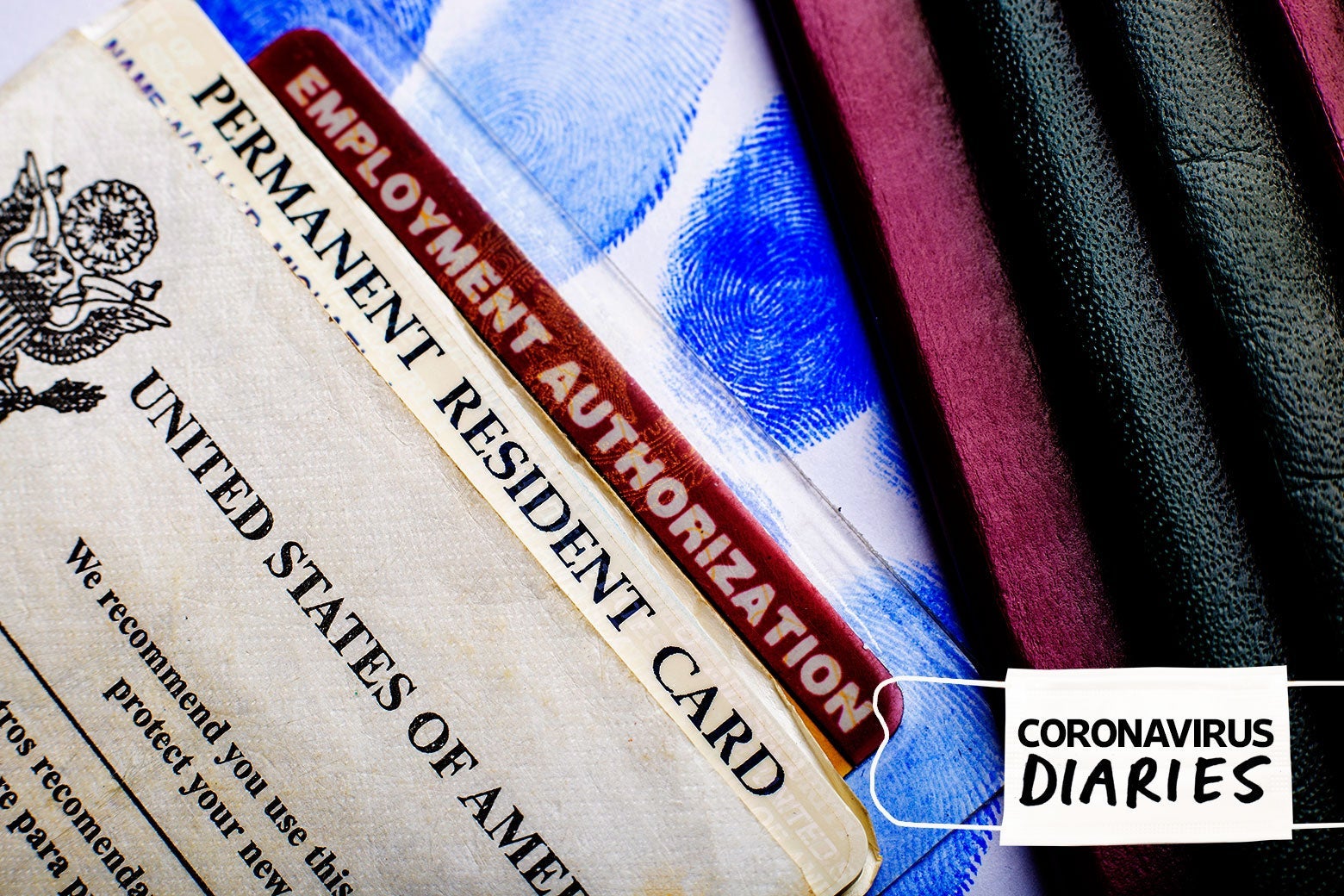Coronavirus Diaries is a series of dispatches exploring how the coronavirus is affecting people’s lives. For the latest public health information, please refer to the Centers for Disease Control and Prevention’s website. For Slate’s coronavirus coverage, click here. If you have a story we should tell, please email coronavirusdiaries@slate.com.
For months, my husband and I have been preparing for an interview with United States Citizenship and Immigration Services for my green card. To prove the legitimacy of our marriage, we practiced answering Newlywed Game–style questions, copied leases and bills that bear both our names, and started making a photo album that shows the history of our relationship spanning five years. But then, on March 18, I received a call from my immigration lawyer. She told me that my interview, which was scheduled for April 1, has been canceled.
USCIS has suspended “routine in-person services” in response to COVID-19, and it has not announced if there will be a video appointment option. As of this writing, USCIS has extended the cancellation of in-person appointments through May 3, though its website indicates that it can be extended even further.
I was an international student for nearly six years, working toward my Ph.D. in chemistry, which I earned in February. Graduate school was tough. I often worked late nights and weekends. I haven’t been home—Seoul, South Korea—for more than four years, mostly because my grueling work consumed all my time, leaving me no room for a 14-hour direct flight and the jet lag from the 13-hour time difference.
But then even after completing my Ph.D., I couldn’t risk visiting home. After marrying my U.S. citizen boyfriend of four years in January last year, we filed a petition for my green card—officially known as a permanent resident card. My travel restrictions became more stringent. I was unable to leave the country because my green card case could be considered abandoned if I did. Border agents have the discretion to bar anyone who’s not a citizen from reentering the country at any time. Considering the current administration’s track record on immigration issues, my lawyer advised me not to leave the country unless there is a family emergency.
When I was applying for a green card, my lawyer assured me that it wouldn’t be too long before I received permanent residency status, albeit a conditional one (if you receive a green card through marriage, you have to prove that the marriage is still legitimate after two years in order to obtain an actual permanent residency). Because I’ve been living in the U.S. legally through my student visa and my husband doesn’t have any red flags, I was told that our case would be smooth sailing.
However, things are not going as smoothly as we hoped. There already had been a delay even before this pandemic hit. It took USCIS four months to schedule the first step of the process, which is fingerprinting, instead of the typical six weeks. My lawyer had to send two written inquiries to find out what the delay was, to no avail. I later learned that USCIS workers were asked “to volunteer for administrative work in Immigration and Customs Enforcement field offices across the country,” despite the enormous number of backlogged cases.
Now that the pandemic may indefinitely delay my green card interview, I don’t know when I’ll finally be able to go home. I miss my family. I miss my friends. And I miss my hometown. I kept repeating “I’ll be home in six months” to my friends and family for the last year or so, and I think they stopped believing me. Missing out on many joyous occasions for those closest to me is the most heartbreaking. Since my last visit, many of my friends got married. I attended none of the weddings. One of my best friends had a baby girl. She’s now almost 2.
Travel restrictions also mean that I cannot be one of the many Koreans returning home, fleeing the dire circumstances in the U.S. and Europe. South Korea, through diligent coronavirus testing, seems to have successfully flattened the curve. Though people are still cautious, “South Korea is pondering sustainable ways of continuing the quarantine system while also allowing for a return to normal,” a local English-language newspaper writes.
I fully realize that I’m in a privileged position: I have an immigration lawyer who keeps me up to date on any changes in the immigration laws and regulations; I have a work permit that allows me to legally earn income (if I can find work); I have in-laws who got my husband and me out of New York City, the epicenter of COVID-19 in the U.S., and treat me like one of their own. I am even eligible for the $1,200 relief check because I have a Social Security number. I know that other migrants aren’t as lucky as I am.
As for now, all I can do is wait for the interview to be rescheduled. While I wait, I’ll be daydreaming about the things that I want to do when I eventually return home: meeting my best friend’s daughter for the first time, eating my mom’s home-cooked meal, and visiting my college campus to reminisce about the young and carefree life I once had.
Slate is making its coronavirus coverage free for all readers. Subscribe to support our journalism. Start your free trial.
